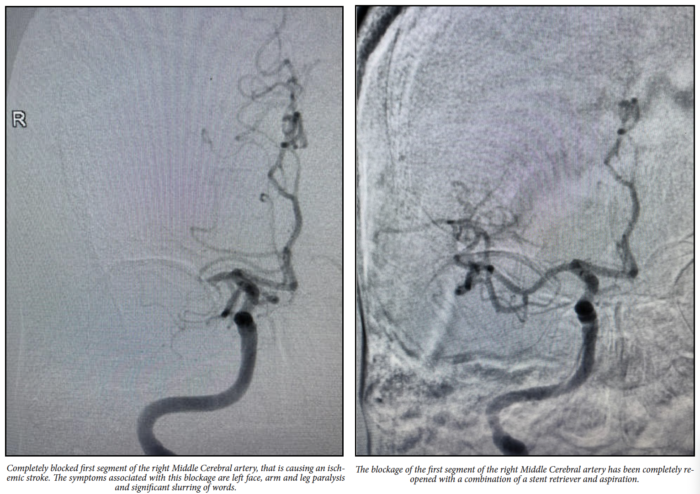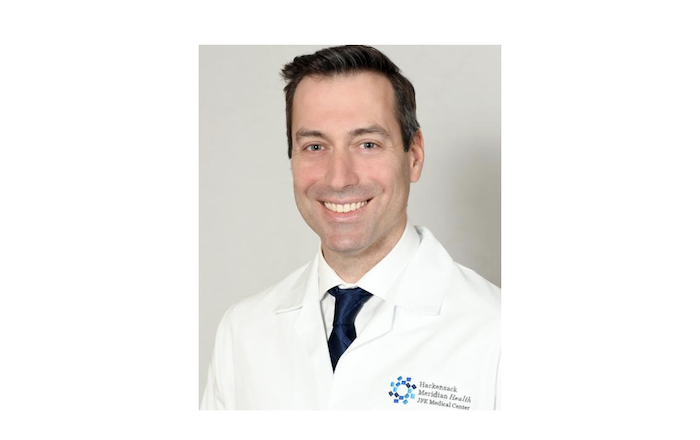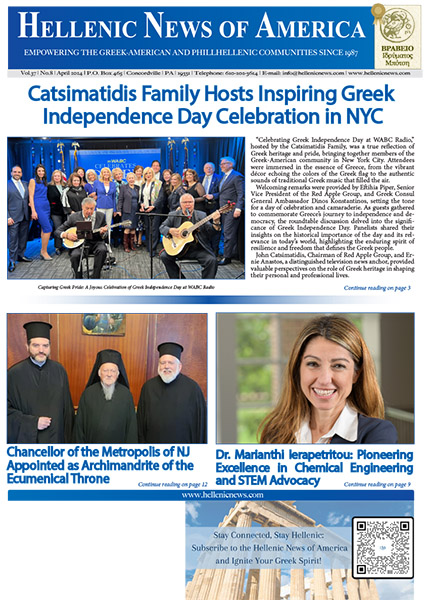By Leslie Krowchenko, Special to the Hellenic News of America
Every 40 seconds, someone in the United States has an ischemic (lack of blood flow) stroke, according to the Centers for Disease Control and Prevention. Strokes are the nation’s leading cause of long-term disability.
Haralabos Zacharatos, D,O., strives to prevent his patients from suffering a stroke and works to ensure their recovery if they do.
Dr. Zacharatos, an Interventional Neurologist, is board certified in vascular neurology and endovascular neurosurgery and is affiliated with Hackensack Meridian Neuroscience Institute at JFK University Medical Center in Edison (part of the Hackensack Meridian Health network). He has been in practice for more than 15 years and has co-published several journal articles and book chapters in the field.
“The brain is very sensitive to lack of oxygen,” he said. “The better a person can identify neurological changes, the sooner the person can be evaluated for an ischemic stroke, which can make a difference in the overall outcome.”
A 2005 graduate of Rowan University School of Osteopathic Medicine, Dr. Zacharatos completed his residency in Neurology and fellowships in Vascular Neurology and Endovascular Surgical Neuroradiology at the University of Minnesota Medical School. He received the university’s Mary Bizal Peterson Research Award and The John R. Gates Award, the latter named for the founder of the Minnesota Epilepsy Group.
Dr. Zacharatos is dedicated to educating his patients about the causes of and remedies for stroke, a medical condition that triggers the brain to stop functioning properly. Nearly 90 percent result from a blockage of blood flow to the brain; known as ischemic strokes, they prevent the brain from getting proper oxygen and nutrients, causing cells to begin dying within minutes. Approximately 10 percent of strokes are caused by a sudden bleeding in the brain, also called a hemorrhagic stroke. All types of stroke cause damage to the normal parts of the brain, resulting in a neurologic dysfunction that patients manifest physically.
Both types of strokes share many of the same risk factors, such as high blood pressure, diabetes, high cholesterol, and tobacco dependence. High blood pressure can affect the small, medium, and large blood vessels, causing the walls to become thin and could lead to narrowing of the blood vessels. Dr. Zacharatos likened the explanation to a tree, comparing the carotid arteries in the neck to large limbs and the vessels in the brain to smaller branches.
“With every beat, blood flows from your heart to your brain,” he said. “A stroke occurs when there is either a lack of blood flow or excess bleeding to certain areas of the brain, causing you to lose function in the parts of your body controlled by those parts of the brain.”
The signs and symptoms of a stroke often occur quickly yet can develop over hours or days. Signs may include sudden confusion, trouble speaking or understanding speech, numbness in the face, weakness or paralysis of one side of the body, severe headache with no known cause, eyes fixed in one direction and/or difficulty walking, dizziness, or loss of balance.
 “People may detect these signs in themselves (‘why am I weak/my vision is blurry’’) or someone else (‘why is the person’s face drooping’),” said Dr. Zacharatos. “The important thing is to act quickly and get a neurologic evaluation to determine if someone is experiencing a stroke.”
“People may detect these signs in themselves (‘why am I weak/my vision is blurry’’) or someone else (‘why is the person’s face drooping’),” said Dr. Zacharatos. “The important thing is to act quickly and get a neurologic evaluation to determine if someone is experiencing a stroke.”
If any of the signs are observed, he emphasized immediately calling 9-1-1 and getting the individual to the hospital as fast as possible. Determining the type of stroke will determine the course of care, and early intervention is essential.
“Doctors stress the phrase ‘time is brain,’ for with each minute the brain loses oxygen, certain parts of it are affected,” he added. “The time from the first symptom to treatment can define the long-term outcome.”
Strokes are detected based on the patient’s symptoms and neurological examination. Modern technology allows for the identification of a brain bleed or a blocked blood vessel in the neck and/or the brain. Treatment is centered on the type of stroke suffered, its cause, and the part of the brain involved. In all cases, timing is critical.
Dr. Zacharatos specializes in diagnosing, treating, and managing conditions of strokes and other cerebrovascular diseases. For patients suffering an ischemic stroke, blood flow must rapidly be restored to the brain. Treatment may begin by administering alteplase or tenecteplase, drugs given intravenously to reopen blood vessels and dissolve the clot causing the stroke. An injection may be given up to 4.5 hours after the onset of symptoms.
Time is also vital in hemorrhagic strokes, with treatment focused on controlling the bleeding and reducing pressure in the brain. Controlling the pressure is critical to prevent the blood from expanding.
With an ischemic stroke caused by a blocked artery in the neck and/or the brain, Dr. Zacharatos accesses different arteries in the body to attempt to re-open the blocked blood vessel. Reopening the blocked blood vessel aims to restore the normal blood flow to the brain. Alternatively, when a person has a brain bleed, a multi-disciplinary discussion takes place with the neurosurgery team to determine the cause of the bleeding and the best treatment option. Our stroke patients are medically managed in the Neuro Critical Care Unit, under the close supervision of the medical team.
Stroke recovery involves a multi-disciplinary approach among physical and occupational therapists, speech-language pathologists, and physical medicine and rehabilitation (PM&R) physicians. The specialists work together to determine the best type of rehab based on the patient’s functional capabilities.
Lifestyle changes, such as choosing heart-healthy foods, managing weight and stress, regular aerobic physical activity, quitting smoking, and getting enough sleep, can aid in recovery and may help prevent another stroke. Following one’s treatment plan and coordinating with healthcare providers is essential.
“Recovery after a stroke is patient-dependent because each person’s brain deals with the brain injury differently, he said. “We objectively evaluate every person and recommend giving the person’s brain enough time to heal, which is approximately 90 days after the stroke; although recovery is an ongoing process.”
Dr. Zacharatos and his neurological colleagues are not the first line of stroke defense. Recommendations for stroke prevention are in many cases the same as those suggested for recovery, such as choosing healthy food (fresh fruits and vegetables, low in saturated fat and cholesterol), maintaining a healthy weight, regular aerobic activity (8,000-10,000 steps per day), not starting or quitting smoking, limiting alcohol and being aware of one’s genetics. Individuals should also work with their healthcare team, talking with providers about steps to lower stroke risk, including monitoring cholesterol, blood pressure, and diabetes.
Ischemic and hemorrhagic strokes can be extremely disabling. Prevention is the best treatment. “Regular checkups, especially with your primary care doctor, are essential,” said Dr. Zacharatos. “If you know you have high blood pressure, for example, be sure to take your medications as they are prescribed, not as you feel, to prevent long-term effects.”
Know Your Risk for Stroke and Heart Disease
Screenings like a CT Calcium Scoring scan or AngioScreen are helpful tools to better understand your risk for heart disease. To schedule a screening or make an appointment with a physician, call 844-HMH-WELL or visit HMHhasHeart.com






